Evaluating the Launch of Toshiba's S300 AI Surveillance HDD: What You Need to Know

Toshiba has recently unveiled its new S300 AI surveillance hard disk drives (HDDs), designed to address the growing demands of artificial intelligence (AI)-driven video applications. With storage capacities ranging from 8TB to an impressive 24TB, this innovative product promises enhanced performance and enterprise-grade reliability tailored specifically for modern surveillance systems. The announcement positions Toshiba as a competitive player in an industry rapidly evolving under the influence of AI technology.
Positives of the S300 AI Surveillance HDD
- High Capacity: The availability of storage capacities from 8TB to 24TB ensures that businesses can store extensive amounts of video and analytical data.
- Optimized for AI Workloads: The S300 AI is specifically tuned for the additional random access demanded by AI workloads, improving data retrieval times essential for real-time analytics.
- Scalability: Supporting up to 64 high-resolution camera streams and an additional 32 AI streams allows easy adaptation to evolving surveillance needs.
- Reliability: With an annual workload rating of 550TB and a mean time to failure of up to 2.5 million hours, the S300 AI is built to handle continuous operation in mission-critical environments.
These features present a strong case for Toshiba's new HDDs as effective solutions for various sectors, including transportation, healthcare, and smart city initiatives. The emphasis on enterprise-grade durability and a robust warranty bolsters Toshiba’s reputation in delivering reliable technology.
Points to Consider
While the positive aspects of the S300 AI are significant, it is essential to approach such announcements critically:
- Market Saturation: With several competitors already present in the surveillance storage sector, does Toshiba's new offering have enough differentiation to stand out?
- Long-term Viability: Can Toshiba maintain performance and reliability at such scale, particularly given the rapid pace of technological change in AI surveillance?
- Dependency on AI: As reliance on AI technology grows, is there a risk associated with a potential slowdown in AI adoption impacting HDD sales?
- Cost-effectiveness: Will the enterprise-grade pricing reflect proportional value to end users, especially small businesses?
As these points illustrate, while the launch has its merits, there remain uncertainties that could affect its long-term impact on the market.
In conclusion, Toshiba's S300 AI surveillance HDD brings significant advancements that benefit enterprises looking for high-capacity, reliable storage solutions tailored for AI workloads. It highlights their commitment to adapting to evolving technology while posing questions about future market dynamics and consumer response.
DiskInternals specializes in data recovery software for both virtual and real environments. We understand the ramifications of data loss firsthand and offer solutions to minimize risks associated with system failures and data corruption. As technological advancements continue to emerge, ensuring data security remains paramount.